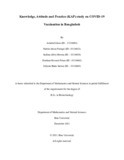Knowledge, Attitude and Practice (KAP) study on COVID-19 vaccination in Bangladesh
Date
2021-12Publisher
Brac UniversityAuthor
Islam, AshabulFaruqui, Nairita Ahsan
Mowna, Sadrina Afrin
Prium, Durdana Hossain
Sarwar, Subyeta Binte
Metadata
Show full item recordAbstract
Coronavirus Disease 2019 (COVID-19), an infectious respiratory disease caused by the viral
strain, severe acute respiratory syndrome coronavirus 2 (SARS-CoV-2), has become a distinct
cause of the global burden and a rising concern to global public health. Despite earliest cases
dating back to mid november of 2019, COVID-19 cases were first confirmed on the 8th of march
in Bangladesh. While initial treatments followed generalized drug use based on treating
symptoms or antibody-based therapies, the need for vaccines remained to be of significant
importance. With the need for vaccines to get the world back on track, scientists through their
extensive study and research developed vaccines at the earliest i.e. within a year (2020).
Similarly, Bangladesh adapted and began immediate administration of COVID-19 vaccines on
27 January 2021, while mass vaccination started on 7 February 2021. However, the fast
production and distribution of vaccines has raised questions and possible suspicions. This along
with several other factors such as knowledge, attitude and practice (KAP) of the Bangladeshi
population had contributed to an overall decreased rate of vaccinations. Therefore, in our study,
we evaluate these correlating factors of KAP with COVID-19 Vaccination to understand how
knowledge, attitude and practice, may have possibly contributed to this reduced rate and
consequently, in the spike or as a trigger for the second wave.

